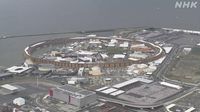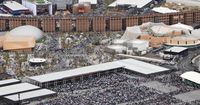The Osaka/Kansai Expo, themed "Designing Future Society for Our Lives," officially opened its doors on April 13, 2025, welcoming a total of 119,000 visitors on its inaugural day. The Japan Association for the 2025 World Exposition reported that over 140,000 advance reservations were made, but adverse weather conditions and congestion at the venue and transportation systems likely impacted attendance numbers.
Despite the challenges, the Expo, which spans approximately 155 hectares—about 33 times the size of Tokyo Dome—has ambitious goals. It aims to showcase innovations from 158 countries and regions, along with seven international organizations. The event is scheduled to run daily from 9:00 a.m. to 10:00 p.m. until October 13, 2025.
In an effort to streamline attendance, the Expo Association promoted a "no-waiting" experience by implementing digitization strategies, including online ticket sales and a reservation system. However, the initial response to advance ticket sales fell short of expectations, prompting the sale of same-day tickets, including nighttime tickets available from 5:00 p.m. on the opening day.
Visitors faced long lines at the gates, particularly with strong winds and heavy rain making conditions less than ideal. Communication issues near the East Gate compounded the situation, causing disruptions to entry and pavilion reservations. Shuttle buses from major stations also experienced congestion, further frustrating attendees.
YouTuber Korekore, who boasts over 2.32 million subscribers, shared their experience on social media, expressing mixed feelings about the event. They noted, "I went to the Osaka Expo, which I was told by people around me to never go to!" Korekore reported that they managed to enter the venue within ten minutes of their 9:00 a.m. reservation and found the West Gate significantly faster than the East Gate.
On the topic of food, Korekore commented on the high prices, stating that while the Kobe and Matsusaka beef served were delicious, drinks were not complimentary. They also pointed out that the cashless payment system encountered issues due to poor reception within the venue, leading to several errors during transactions.
Regarding pavilion reservations, Korekore expressed dissatisfaction, stating, "Same-day reservations were difficult and filled up quickly, making it hard to see anything." They also criticized the behavior of some attendees, particularly TikTokers who were live-streaming, calling it disruptive. The weather on the opening day, unfortunately, meant many visitors sought refuge inside the ring due to heavy rain and strong winds.
The Expo's organizers are now faced with the challenge of balancing crowd management with smooth operations. The long wait times at the gates on opening day raised concerns about how the event will handle the anticipated influx of visitors in the coming months.
Despite the initial hiccups, the government estimates the economic impact of the Expo could reach 2.9 trillion yen, with expectations that it will boost inbound tourism significantly. Stocks related to Kansai railways, popular gaming pavilions, and food vendors are expected to benefit from increased foot traffic.
However, market expectations for Expo-related stocks are tempered by concerns over poor advance ticket sales and delays in pavilion construction. Analysts suggest that as awareness of the exhibits grows, interest in these stocks may increase.
The Expo's theme, "Designing Future Society for Our Lives," aims to address global challenges and promote sustainability through innovation and collaboration. As the event progresses, it will be crucial for the organizers to adapt and improve visitor experiences, ensuring that the Expo remains a highlight of 2025.
In summary, the Osaka/Kansai Expo's opening day was marked by both excitement and challenges. As the event unfolds over the next six months, the focus will be on improving visitor experiences and managing crowds effectively. With high hopes for economic impact and global engagement, the Expo represents a significant opportunity for innovation and cultural exchange.








